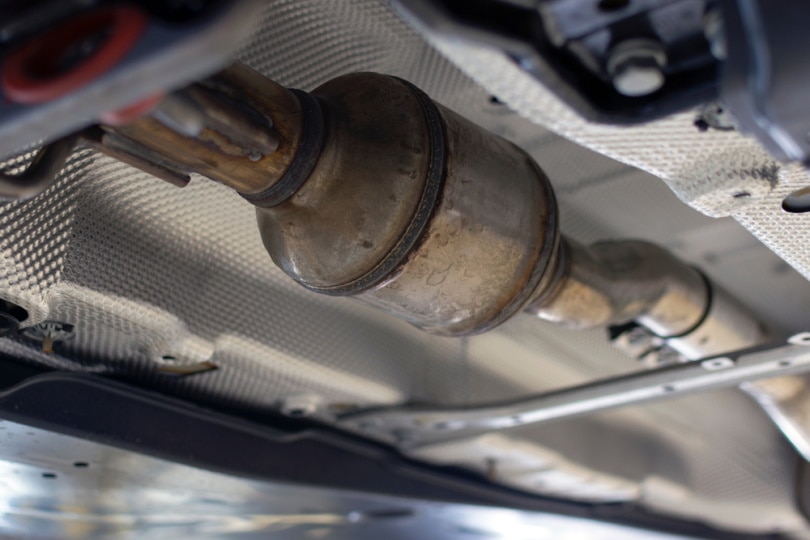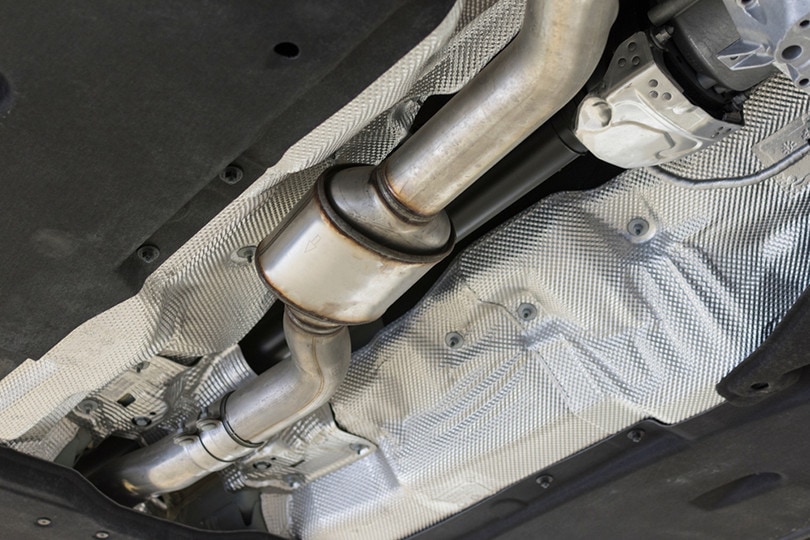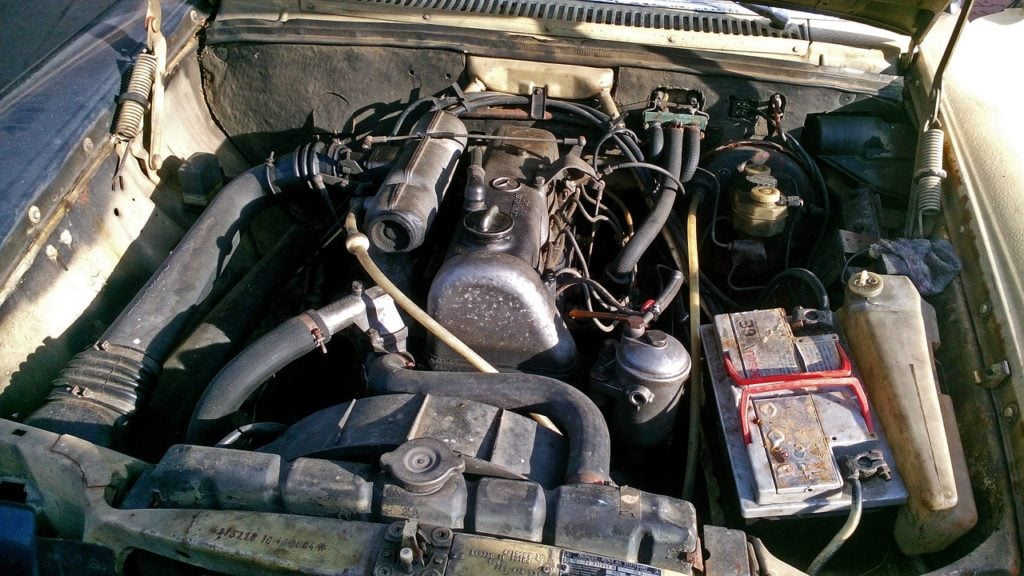How Much Does a Catalytic Converter Cost? Facts & FAQ
-
Pete Ortiz
- Last updated:

Every modern vehicle is equipped with a component called a catalytic converter. These converters are essential to your exhaust system and typically last about 10 years or more, though they will need to be replaced when they become damaged or clogged.
But how much does it cost to replace a catalytic converter? And what are the symptoms of one that needs to be replaced? You can expect to pay between $1000 to $3,000. We’ve done a bit of research on this car part, keep reading as we explain further.
How Much Does It Cost to Replace a Catalytic Converter?
On average, your typical catalytic converter replacement can cost around $1000 to $3,000 or more. So to say, it isn’t a quick and cheap repair. Factors contributing to the cost include the make and model of your vehicle, its year, as well as the extent of damage to the catalytic converter. The part alone can cost anywhere from $600 to $1,200, and for labor, you can expect to pay anywhere from $60 to $120 or more an hour.
Though it may look like a simple part to replace, disassembling a catalytic converter on most vehicles involves removing many parts and, in some cases, the entire exhaust system. This involves cutting off and removing bolts, welding new parts on the car, as well as disconnecting gaskets, and ensuring proper alignment with the new part.
In short, this repair can become very extensive. And in some cases, if your car is on the older side, mechanics may recommend simply getting a new vehicle to avoid paying for a repair that may cost more than what the vehicle is currently worth.

What Is the Purpose of a Catalytic Converter?
Every modern vehicle on the road is equipped with a catalytic converter. And if the converter is not working properly, your car will not pass any state-required smog or emissions test. This component is absolutely crucial to your vehicle’s performance and can cause severe issues to your engine if left un-repaired for an extended period of time.
A catalytic converter is positioned beneath a car, and lies in front of the muffler, behind the exhaust manifold. For the most part, it sits right in the middle of your vehicle’s exhaust pipe. The exterior of a catalytic converter almost looks like a muffler.
However, on the inside, it has a honeycomb interior filled with metals, often including palladium, platinum, and rhodium. This gives the converter an expansive surface area which allows it to pass exhaust gasses easily. Once the gas makes contact with the metal surface, it converts them into less dangerous emissions.
The 6 Bad or Clogged Catalytic Converter Symptoms
Catalytic converters typically last 10 to 15 years or more. This means that it’s likely that you may not ever have to replace one in your vehicle.
Remember that driving with a bad catalytic converter cannot only cause significant damage to your vehicle’s engine, but it’s bad for the environment. So, if the time does come when you have to replace this component, it’s best to know the signs to recognize when it becomes faulty.

1. The Check Engine Light Comes On
The first sign that your catalytic converter is going bad is if the “Check Engine” light illuminates. Note that this can signal a variety of issues with your vehicle, so it’s best to take your vehicle to a repair shop so that they can give you a proper diagnosis.
2. Sulfur Smell Coming From Car
If the catalytic converter has a clog, it will not be able to convert the exhaust fumes due to an airflow restriction. In turn, you may notice a rotten egg, burnt, or sulfur-like smell coming from the vehicle while you’re driving. This is one of the most common signs of a broken catalytic converter or one that’s one the brink.
3. Acceleration Starts Lagging
Another common sign is when the car starts to lag when you hit the gas pedal. If you notice that the car suddenly has a delay when you accelerate (whether you do it slowly or fast), the issue could be with the catalytic converter being clogged or having a faulty oxygen sensor. You may also notice the car sputtering while you’re driving.

4. Fuel Consumption Increase
An increase in your vehicle’s fuel consumption is another tell-tale sign that there may be issues with its catalytic converter. Improper combustion of the vehicle’s fuel happens when the exhaust becomes clogged. And if this continues over a long period of time, the engine won’t be as efficient, and it can lead to it eventually seizing up and going out.
5. Rattling Sounds Beneath Car
Sometimes you may be able to hear a faulty catalytic converter. In scenarios when it’s really bad, the metal honeycomb structures inside of the converter will break apart in small pieces. As a result, these pieces will move around when the car is in operation, causing a loud rattling sound beneath the vehicle. It may be particularly loud when you press the accelerator.
6. Emission Failure
There are also cases where you may not know that your catalytic converter is faulty until you get a failed emissions test. Not only will it cause an increase in the car’s emission of volatile gasses, but it can cause the catalytic converter to become clogged and lead to other issues.
If your car fails an emissions test, be sure to take itto a repair shop as soon as you can. It’s also important to note that other exhaust-related issues can cause an emissions test failure, such as blown gaskets, loose components, and faulty sensors.
Conclusion
A catalytic converter is an essential component in your vehicle’s exhaust system and replacing it can be fairly expensive. Foul smells coming from the engine, lagging acceleration, and a suddenly illuminated check engine light can all be signs that your catalytic converter is on thebrink. It is important to have your car checked out immediately as a faulty converter can emit toxic fumes and cause serious issues to your engine.
- https://www.autozone.com/diy/exhaust/how-much-does-a-catalytic-converter-replacement-cost
- https://shop.advanceautoparts.com/r/advice/car-maintenance/how-much-does-it-cost-to-replace-a-catalytic-converter
- https://www.autoexpress.co.uk/car-news/108937/what-is-a-catalytic-converter
- https://auto.howstuffworks.com/question66.htm
- https://www.uti.edu/blog/automotive/catalytic-converter
Featured Image Credit: Ulianenko Dmitrii, Shutterstock
Contents


